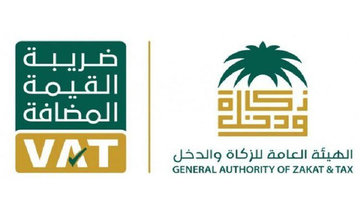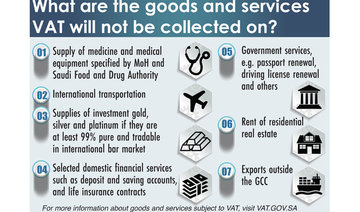RIYADH: Businesses with annual revenues of more than SR1 million ($266,640) have been urged to hurry their value-added tax (VAT) registration process and ensure their readiness for its implementation in just 29 days, on Jan. 1, 2018.
The General Authority for Zakat and Income Tax (GAZT) stressed the importance of visiting the VAT website vat.gov.sa, to check the procedures and requirements, and follow the instructions to be fully ready to start committing to the VAT laws and regulations.
Companies with annual revenues of more than SR1 million were given until Dec. 20 to register, while the deadline for companies with annual revenues between SR1 million and SR375,000 ($99,961) has been extended by a year (Dec. 20, 2018). The registration is optional for businesses with annual revenues between SR187,500 and SR375,000.
Businesses that fail to register in time will face fines of up to SR 10,000 and the suspension of several critical government services, including issuing of work permits, changing business activity, issuing visas, transferring workers’ sponsorship and other services provided by the Ministry of Commerce and Industry, the Ministry of Labor and Social Development, the Ministry of Municipal and Rural Affairs, the Saudi Customs and the Saudi Arabian Monetary Agency.
GAZT underlined its readiness to answer any questions about VAT. The website vat.gov.sa features a guidance manual to help businesses prepare for VAT, including video tutorials, guidelines, information packs on all aspects of the registration and readiness process, as well as a wide range of tools and information.
GAZT confirmed that VAT will be introduced on Jan. 1, 2018, urging all eligible businesses to register before the deadline of Dec. 20.
Two types of VAT bills to be issued
The GAZT has also announced the VAT invoice form to be adopted with the introduction of the tax as part of improving tax compliance levels, Arqaam news website reported.
Two forms of bills will be approved, the GAZT said.
The first is a simplified tax invoice for the supply of goods or services with a total value of less than SR1,000 containing the date of issue, the name and address of the supplier and the tax identification number, the supplied goods or services, and the due payment for goods or services.
It also includes clarification of the tax payable or indicating that the consideration includes the tax in respect of the supply of goods or services, and a simplified tax invoice may not be issued in respect of inter-supply or export of goods.
The second model is for supplies above SR1,000. The invoices for these supplies will be more detailed, based on Article 53 of the executive regulation.
The regulation states that the tax invoice shall be in Arabic, in addition to any other language in which it may be issued.
The invoice should include the date of issue of the invoice, the serial number identifying and distinguishing the tax invoice, the supplier’s tax identification number, the customer’s tax identification number “if the customer is responsible for the calculation and statement of the tax on the supply” and the date on which the supply was signed.
It should also include the name and address of the supplier and the customer, the quantity and nature of the goods supplied, the scope and nature of the services provided, the amounts subject to tax according to the rate or exemption, the tax-exclusive unit price and any discounts or rebates if they are not included in the unit price and tax rate.
















